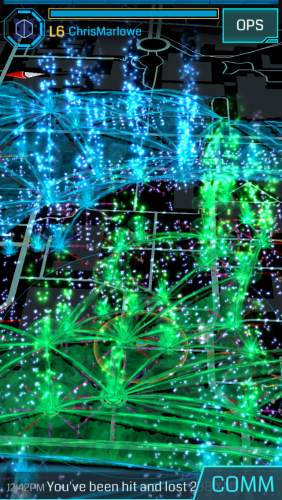I’m addicted to Augmented Reality. Specifically, my obsession comes in the form of a game called Ingress. Ingress uses the GPS in your phone to locate you in relation to landmarks called portals, which are placed at points of interest all over the world. Your primary goal as you walk around the world is to take portals from the opposing team – you can be on team “Enlightened” or team “Resistance” – and link them together to create triangular fields covering populated areas.

Many Ingress players take the game very seriously. When I met up in person with some of the more experienced players on my team in Austin, they showed me archived pictures of fields that have covered entire continents. The picture of Europe and Asia above shows some of the larger fields that were in existence as of 11:46 am on Wednesday September 23, 2015. But fields wink in and out constantly as players establish new links or take down each other’s portals.

I’ve only been playing this game for a few weeks, since the Augmented Reality group began, but it doesn’t take long to become obsessed. You can see me every day walking to school with my head down, staring at my phone as I attack and take over portals. The UT campus and surrounding area are covered in portals (as you can see in the image to the left), and due to the high population density, they often turn over multiple times a day.
Felipe Cruz, another member of the Augmented Reality group, is on the opposing team, so we have a friendly competition going. Resistance forever!
What I’ve learned from playing Ingress is that AR can enhance the world rather than just an adding another layer to it. AR inscribes meaning on the surface of daily life, giving significance to landmarks that one might easily pass by without noticing them. To “augment” can mean either simply to extend or increase something, or it can mean to improve it. Playing Ingress has added enjoyment to my daily life. I don’t know that anyone will become addicted to our app, but I believe that we can enhance reality with our work rather than merely adding to it and, as Ingress does, inscribe new meaning on the surface of daily life on the UT Campus.



[…] my colleague Deb Streusand recently wrote on our blog, we have been playing an augmented reality game called Ingress. It turns the entire world into a […]
[…] itself connects both to these elements of graphic design and to theatrical performance. When I play Ingress, I take on a role, with an assumed name and mission, and move through space performing that role. I […]